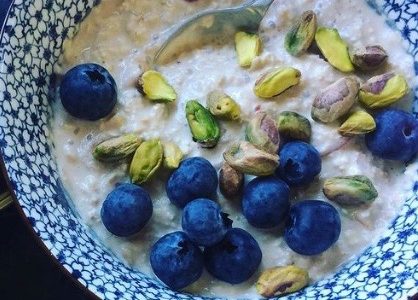Blood pressure & Blueberries

All sorts of functional ‘Superfoods’ have recently been jumping on the bandwagon of nutritional health claims. Blueberries actually got the ball rolling in this department over a decade ago, but whilst the ‘health claims’ of food marketeers can be persuasive, they don’t always reflect the facts with accuracy. I like to unpick the scientific evidence behind so-called super-foods, and see if there’s any real weight to the claims.
So I welcomed a recent piece of placebo controlled research on blueberries that presents positive supporting evidence for a health claim that has been widely known by nutrition professionals for some time. Namely, that regular consumption of just one cup of blueberries can reduce blood pressure and the sort of stiffness in blood vessels and narrowing of arteries that is associated with atherosclerosis and cardiovascular disease.
I particularly liked the fact that the evidence from this study easily translated into a piece of dietary advice that is very ‘do-able’ for anyone with cardiovascular concerns. We’re not talking about needing to consume crazy amounts of some unobtainable extract, from some obscure herb or plant. One cup of blueberries per day will do it and if you fear boredom setting in after a week or two of consuming blueberries, understanding a little bit of the science behind how they work, can enable anyone to choose a variety of similar foods with the same mode of action.
The study, published in the Journal of the Academy of Nutrition & Dietetics (2015, doi: 10.1016/j.jand.2014.11.001), randomly assigned 48 post-menopausal women, with pre- and stage-1 hypertension (raised blood pressure), to receive either 22 grams of freeze-dried blueberry powder, (equivalent to one cup of blueberries) or 22 grams of placebo powder. The study duration was eight weeks and the group receiving the blueberry powder saw reductions in both diastolic and systolic blood pressure as well as a reduction in blood vessel stiffness. And this is the important mode of action, brought about by a blood molecule called nitric oxide that is involved in maintaining the width and flexibility of blood vessels.
Nitric Oxide
Good blood levels of Nitric oxide enable the sort of flexibility within arteries that better cope with changes in blood flow and pressure brought on by exertion. And it is the colourful pigments within Blueberries and other dark fruit, as well as vegetables like beetroot that maintain good levels of blood nitric oxide. This is important because if blood vessels become stiff, they can suffer damage in the form of micro-tears when blood is pumped through them with greater force. We can be aware of breathlessness when having to climb long stairs when an escalator is out of action, but we can’t see how our blood vessels react to the surge of pressure, brought about from increased blood-flow to fuel the muscles to climb the stairs.
Of course micro-tears in stiff blood vessels will not be felt and will definitely go unseen. The immune system will repair any damage and patch up small tears but over time the resulting build up of plaques reduce arterial flexibility and narrow the diameters of the blood vessels, raising blood pressure.
A small action – big result
Prevention is key – maintain arterial flexibility and climb those stairs with confidence by making blueberries and dark pigmented fruit and vegetables part of your daily diet, secure in the knowledge that evidence based research has shown they optimise blood flow, reduce blood pressure and lower the risk of cardiovascular disease.
To see the study in full follow this link: 2015, doi: 10.1016/j.jand.2014.11.001
